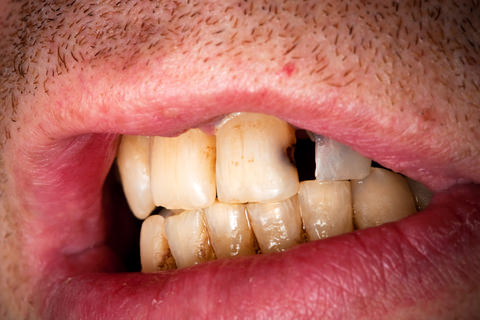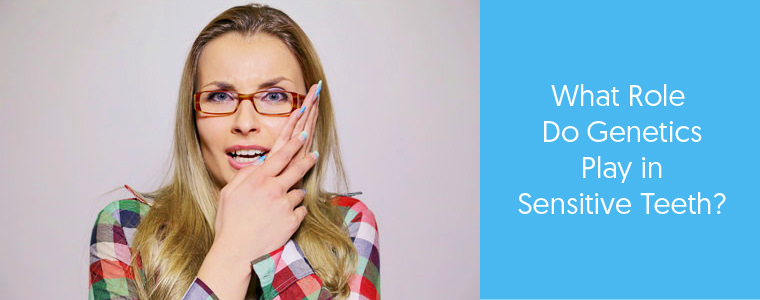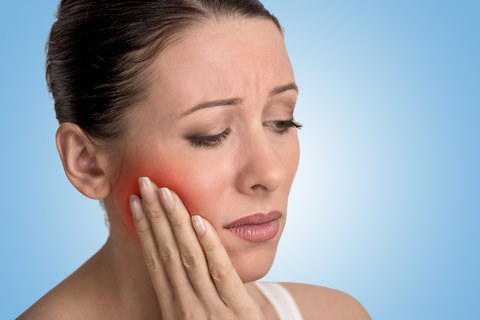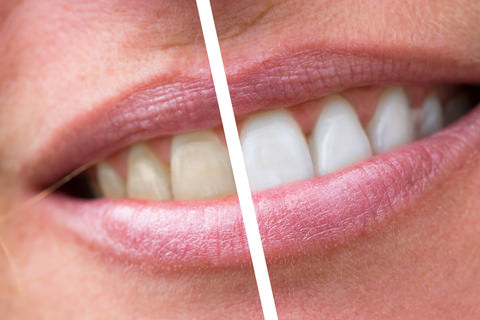Are Sensitive Teeth Genetic?
If you have sensitive teeth you may be wondering – what caused this problem, and can I blame my genetics?
Yes, dental issues can run in the family. There is a chance you may have inherited your tooth sensitivity from a family member.
Although it’s more likely that it’s based on your dental regime and lifestyle factors, oral conditions do have a hereditary basis. This one is known as enamel hypoplasia and would have developed when you were just a baby.
Today’s article is all about what aspects of your teeth sensitivity are connected to your genes – read on to learn just how much control you have over your oral health, and what can be done if you have a case of tooth sensitivity.
Can you Blame Genetics for Sensitive Teeth?
So, perhaps you’ve done everything properly – you’ve brushed and flossed your teeth, had a healthy, non-acidic diet, yet your teeth are still highly sensitive.
Chances are that you were born with defects in your enamel (the hard, protective layer that covers your tooth) or your dentine (the dense, bony tissue that forms the bulk of your tooth, beneath the enamel).
Defective enamel development can be a result of an inherited condition called enamel hypoplasia, which occurs whilst teeth are still developing. It can affect both your baby teeth and permanent teeth, and results in thin enamel.
Symptoms of Enamel hypoplasia
- In mild cases, you may notice white spots, pits, and grooves on the outer surface of your teeth
- In severe cases, the affected tooth may be brown or yellow (this is the underlying layer of dentin exposed
- This is a result of the teeth lacking in enamel and increasing risk of, amongst other things, sensitive teeth.
Causes of enamel hypoplasia include;
- Genetics – Yes, that’s right, it’s hereditary.
- Prenatal issues – Disturbances during the pregnancy phase such as maternal Vitamin D deficiency, weight gain, smoking, drug use, lack of prenatal care, premature birth or a low birth weight may lead you to be born with enamel hypoplasia.
- Disturbances during tooth development – Fever, malnutrition, calcium deficiency, chronic kidney failure, jaundice or liver disease can all cause enamel hypoplasia during tooth development. And if you’ve got it, you can pass it down your genetic line.
Treatment for Enamel Hypoplasia
Your Dentist can diagnose the condition by the symptoms and your Dental history. However, if you notice the symptoms in your child, early diagnosis is crucial.
Treatments depend on the severity of your case.
Some smaller defects that are not causing sensitivity may not need immediate treatment – a simple monitoring and application of topical fluoride to help protect the teeth is all that will be needed.
In more severe cases, treatment options include;
- Resin-bonded sealant – This can improve tooth sensitivity.
- Composite (white) fillings – These are durable and can be made to closely match your tooth colour, making them ideal for use on the front or back teeth.
- Amalgam (silver) fillings – These are made from long-lasting metals. However, as they are silver in colour, you may not want them on your front teeth.
- Crowns – These cover your entire tooth.
- Veneers – A less intrusive option than crowns, veneers can be used to enhance the brightness of your teeth.
- Professional dental whitening – Also known as In-house whitening, a much stronger and recommended way to whiten your teeth.
Other Reasons for Teeth Sensitivity
Unfortunately, we can’t blame everything on genetics. You can blame it for a lot – your figure, the colour of your eyes, the colour of your hair, even your likelihood of inheriting certain diseases.
However, if you were not born with enamel hypoplasia, there is one particular aspect of both your health and your appearance that is all your responsibility. All signs are pointing in the direction that the health of your teeth is all based on a good dental care regime.
What else Causes Teeth Sensitivity?
Bad Food Habits
Dental erosion is when your enamel gets worn away.
This may lead to issues with your dentin. Once that happens, the tubules will let all sorts of hot, cold, sweet, sticky, or acidic foods and drinks reach the nerves and cells inside your teeth, resulting in all sorts of discomfort.
Dental erosion usually occurs when too much acid damages your teeth.
This can be from acid reflux, excessive vomiting, or consuming foods that have a high acid content, like certain processed foods, soft drinks, citrus fruits and drinks, foods high in sugar, or alcohol.
You can’t get the enamel back once it’s gone, so try and take care of your teeth by avoiding a diet high in acidic foods and beverages.
Other recommendations are that, due to their high levels of calcium and phosphate, dairy products like milk and yogurt may help ward off erosion. Recommendations include;
- Drinking milk when you have acidic meals or beverages
- Rinsing your mouth with milk after vomiting (you can also do this with water)
- Waiting an hour after you eat or drink something acidic, then brushing your teeth with a soft-bristle toothbrush and fluoride toothpaste. Waiting allows your saliva time to try and remove the acids and using fluoride toothpaste can help strengthen your teeth.
Poor Dental Regime
Any improper dental practices such as inadequate brushing, or not flossing can cause teeth sensitivity.
You must be careful not to brush your teeth too hard, and you should not use a hard-bristled toothbrush, as both can lead to your gums becoming weak.
This can cause periodontal (gum) disease, which over time can lead to gum recession. Missing brushing and flossing can also create a build-up of plaque, which, over time, can lead to cavities.
All of these can cause tooth sensitivity.
Tooth Decay and Cavities
Cavities are little holes in the surface of your teeth. They are caused by a build-up of plaque, that hasn’t been removed by a proper brushing and flossing technique and is now feeding on food and drink debris.
If they haven’t received immediate treatment, cavities can actually work their way past the enamel of your teeth and into the dentin, exposing your nerve root – and that’s when they start to cause you some serious sensitivity.

Tooth decay can cause sensitivity
If you receive treatment for the cavity early enough, your Dentist may be able to reverse it with a fluoride treatment.
If your case is severe, you might need a filling, a root canal, or a dental crown, depending on how much damage there is. In the worst cases, the tooth may not be able to be saved and an extraction might be necessary.
Gum Recession
Your gums have an important job – they help keep your teeth in place. But sometimes, your gums recede, leaving delicate nerves exposed, and leaving you with sensitive teeth.
There are multiple factors that can cause gum recession, including cavities, periodontitis (gum disease), brushing your teeth too hard or using a hard-bristled toothbrush, a gum injury, smoking, or even certain medications.
The treatment required for gum recession depends on what caused it in the first place, but using a softer toothbrush or brushing more gently may help.
One procedure that may be available is a gum graft – this involves your Dentist taking a small piece of gum tissue from one spot and attaching it to the spot where your gums have receded.
A Cracked or Fractured Tooth
A cracked or Fracture tooth can expose your tooth’s pulp – the soft tissue that contains nerves and blood vessels. This leaves it highly exposed to irritation and tooth sensitivity.
Causes of a cracked tooth include chewing those hard foods in the first place, a blow to the mouth, or teeth grinding (bruxism).
If you have a cracked tooth, your Dentist may try treating it with bonding (putting resin in the crack) or a root canal to remove the infection.
Teeth Whitening
You can get a whiter smile after a bleaching session – unfortunately, it can also come with the side-effects of sensitive teeth.
The products used in the procedure can be a major contributor to teeth sensitivity – if you use a kit that’s too strong for your teeth, or even get them professionally whitened, the peroxide in the bleach may cause sensitivity.
If you only do this a few times a year, such as before a special event, you might avoid the pain. Just don’t make it a regular part of your schedule as you can’t get that enamel back once it’s gone.
As for dealing with the sensitivity – desensitising toothpaste may help. But if doesn’t, it’s time to see your Dentist. They may be able to do some bonding and sealing treatments.
What can I do about Sensitive Teeth?
If you are in pain from your sensitive teeth or it is affecting your lifestyle, there are things you can do. These include;
Talk to your Dentist – To be able to treat the problem, you need to know the cause. Once you know the cause, you can find a solution.
Take care of your Tooth Enamel – It’s possible some of your enamel has worn away. Take care of what’s left by;
- Brushing your teeth gently with a soft-bristled brush.
- Avoid acidic foods and drinks – Stay away from soft drinks, lollies, citrus fruits, anything too high in sugar or spicy foods.
- Snack on fruits and vegetables that are full of fibre, including dried fruits such as dates, raisins and figs, and fresh fruits, like bananas and apples. Other options include veggies, such as beans, cabbage and peas, along with peanuts and almonds. An apple is perhaps the simplest solution. Calcium is another crucial ingredient, and dairy products are a great source, with choices such as milk, plain yoghurt and cheese. If you’re worried about your weight or cholesterol, choose skim milk or low-fat yoghurt instead. Other options are broccoli, canned fish with bones, almonds, brazil nuts and dried beans. Also chew on sugar-free gum to up your saliva content.
- If you do eat something acidic, wait an hour before brushing your teeth with a fluoride toothpaste – this allows your saliva time to fight the acids.
- If you’re a teeth grinder, address the issue. If its stress causing you to clench, work on that. If not, see your Dentist about a night guard or other treatments.
- Don’t bleach too often! Talk to your Dentist about whether the whitening is affecting you, and whether you should continue it.
- Invest in toothpaste for sensitive teeth, that contain fluoride – Brushing with desensitising products like fluoride can help. Put a small amount on your finger and apply it on the sore spot, and gently massage it.
- Don’t keep away from the Dentist because of tooth pain – That’s only going to make matters worse! Make sure you keep visiting your Dentist twice-yearly for a check-up.
- Maintain a proper dental care regime – Brush your teeth twice daily, and gently, with a soft- bristled toothbrush. Never forget to floss your teeth as it can clean the corners of the mouth where your brush cannot. Always use a mouthwash after you brush – choose a non-alcohol mouthwash with fluoride content as they are designed to reduce sensitivity. Rinse your mouth with a mouthwash before you go to sleep, as that prevents the mouthwash from getting washed off too soon.
- Drink more water – Drink at least 4L of water every day. It’s especially important you do this after eating, to help wash away any plaque. Another option is a cup of green tea.
- Quit smoking!
Conclusion
People define “bad teeth” differently. Whilst you might define them as teeth that are too large or too small or having issues with spacing. Your Dentist will define bad teeth as teeth in a poor state of health.
There is a genetic disorder that cause some people to be born with sensitive teeth, known as enamel hypoplasia, although this can also be a result of prenatal issues or disturbances during tooth development.
So, whilst genetics may play a small role in bad teeth for some people, science has largely determined that the health of your teeth is – literally – in your hands.
Avoiding sensitive teeth, and all the problems that cause teeth sensitivity, including tooth decay, cavities, gum recession, or a cracked tooth, mainly comes down to proper dental care.
In addition to proper dental care – brushing twice daily, flossing once daily, and visiting your Dentist for check-ups twice a year – making some lifestyle and food changes can help reduce tooth sensitivity.
By Dr. V
Created at October 16, 2019, Updated at January 25, 2025




